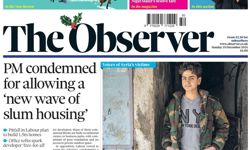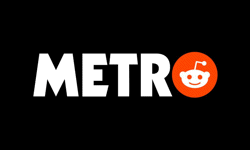
The wrong fight
Do not pick a fight with Marcus Rashford. Do not pick a fight with Marcus Rashford.
Dominic Cummings told MPs in May that he had twice warned the Prime Minister not to enter a “stupid battle” with the England footballer about free school meals. But he did. And lost. Twice.
Learning from those defeats, Boris Johnson, Priti Patel and Jacob Rees Mogg managed to fall into a stupid fight with the entire England football team about taking the knee, dismissing it as gesture politics and declining to chide – and even defending – spectators who booed the ritual. (Of course, no one could describe pulling on an England football shirt over your work clothes – in Rishi Sunak’s case with the tags still attached – as gesture politics). Now they are loudly denouncing the overtly racist social media postings of people like those booing fans.
As is every newspaper. There have been countless articles over the past year about taking the knee, many of them attacking the Black Lives Matter movement and, while not condoning those jeering, sharing their impatience with that moment of reflection on the pitch. Rod Liddle, for example, has variously described it as “a divisive pantomime act that has run its course”, “political grandstanding”, “a vanity project” and “a meaningless gesture”. Richard Littlejohn, who has also visited the subject again and again, was so perplexed by the “taking the knee nonsense” that he gave up his Tottenham season tickets in protest.
Writers who cry “freedom!” while demanding the right to mix socially and walk around maskless, simultaneously rail against concerned young men exercising their freedom to make a point quietly and peacefully. Oh, we don’t question their freedom to do it, they insist. We just wish they’d do it some other way. It’s mansplaining in another arena on a grander scale: people who have never encountered a tenth of the problems others face on a daily basis telling those who have how they should behave or what is an acceptable way to make their voices heard.
For the past month, the Press and the politicians have jostled to prove that they are on the same side as the England football team with their supplements and Downing Street flags. And they are doing so now, with the outrage over the racism that followed the final.
Where does the problem lie?
But they aren’t on the same side. Southgate’s squad understands that their sport has a problem with racism. They know the problem exists in the boardrooms and in the stands and they are using every opportunity to make people face up to that problem – most visibly by taking the knee.
The Press and the Government both resolutely reject the notion that they have a problem with racism and act offended when anyone suggests that they have. They cannot escape that there is a problem with racism in the country at large, but here they insist that it is not “institutional” or “systemic” – as did the Sewell report, which found an upside even to slavery – it’s just a few wrong-thinking individuals. They are in complete denial.
And they have a ready scapegoat: social media. Both the Prime Minister and the Press are singing from the same songsheet. Instagram and Twitter must “up their game” and do something to stop the racist trolling. Urgent action should have been taken to remove the offensive posts aimed at the three hapless players who missed their penalties. Indeed, the Times reported that ministers were demanding that “tech giants” surrender details of people who had abused players, so that they could “make an example” of them – without any consideration of whether it is ministers’ place to be “making examples” of anyone. Or whether such an ambition is compatible with their commitment to free speech and the right to cause offence.
The Press and the Government both resolutely reject the notion that they have a problem with racism and act offended when anyone suggests that they have.
Unconscious bias?
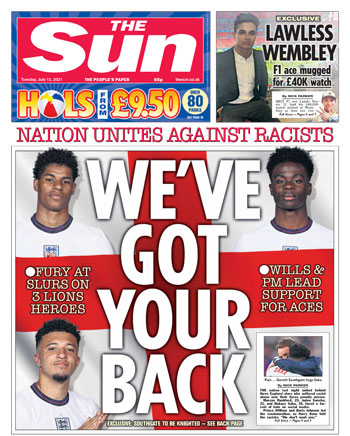
The Sun, publisher of a column in which refugees were described as cockroaches and at least nine front pages attacking Raheem Sterling, has come out all guns blazing, celebrating the arrest of an estate agent accused of tweeting “the n****** lost it for us”.
Maybe it’s taken a look at itself and reformed since that Katie Hopkins column. It would certainly never print the N word. But has it really changed? From the day the tournament began up until yesterday, the paper had given over 24 of its 34 front pages to football. Only eight of those pages featured a black player, even in group shots. Harry Kane has obviously been the face of the team – but we have also seen Maguire, Grealish, Foden, Mount, Shaw, Stones and Rice, plus former players Stuart Pearce and Paul Gascoigne. Until Monday, Sterling and Rashford were the only non-white players to get a look in.
Because while the papers may run virtue-signalling front pages and worthy editorials; while a Prime Minister who used to talk about “piccaninnies with watermelon smiles” may now point to his “levelling up” initiatives and tell racists to crawl back under their rocks, they know where their readers and their voters stand – and their very white interests and attitudes are always going to be uppermost in their minds when it comes to decision making. The most charitable interpretation of this would be to call it “unconscious bias”.
Which is why it’s hard to take too much heart from the sudden appearance of three black players on the front of Tuesday’s Sun or to put too much faith in its “We’ve got your back” promise.
How we report terrible crimes
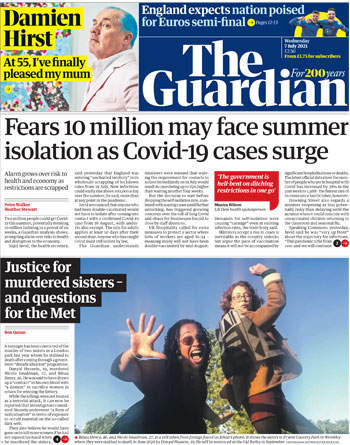
Last summer, two sisters went for a birthday picnic in a London park. They were stabbed to death and their bodies hidden in bushes. When they didn’t return home, their family called the police, but got an indifferent response, so relatives and friends went searching – and found the murdered women.
In spite of the compelling elements of two sisters being killed together and the fact of the birthday celebration, the story made little impact, with the limited coverage pushed back in the book. There was Covid. There had been another “development” in the Madeleine McCann story and the statue of Edward Colston had been toppled in Bristol as part of a Black Lives Matter demonstration in the wake of the killing of George Floyd. This last exercised both the Government and Conservative papers – and led to legislation to outlaw disruptive protests and protect statues. The UK didn’t have a problem with racism, ministers declared; the BLM demos were about something in America and nothing to do with us.
Fast forward to March this year. A 33-year-old woman goes missing while walking home from a friend’s house near Clapham Common. Megxit and the Sussexes’ upcoming interview with Oprah Winfrey dominate the news, but the search still makes front-of-the-book page leads, with stories first about her “frantic” friends, then about how homicide teams have been brought into the search. A week later, with the Oprah fallout still filling oceans of space, the case bursts on to every front page when a body is found – and a Metropolitan Police officer is arrested on suspicion of kidnap and murder. Columnists across the spectrum share their opinions on the dangers to women of walking alone in open spaces and a vigil is planned for Clapham Common the following Saturday. There are wrangles over Covid laws, the Duchess of Cambridge pays a visit, and there are later scuffles and allegations of heavy-handed policing.
Teenager convicted
Last month, a teenager went on trial for the murder of the sisters. On the first day, the prosecution alleged that he had made a pact with the Devil to “sacrifice” six women every six months in exchange for a Euromillions lottery win. In other words, a serial killer in the making. The story was the splash for the Metro, with the sisters making their first front-page picture appearance. The Guardian put it on page 5, the Telegraph on page 9, the Times on 15, the Express on 18, the Mirror on 19, the Mail on 20 and the Sun on page 23. There were more important fish to fry. Harry had upset the Queen again and Liam Gallagher thought he was an “effin woke snowflake”.
The teenager was convicted last Wednesday. The story made just one front page: the Guardian. The Times preferred yet another picture of Helen Mirren and a story about boiling lobsters, the Telegraph a nib about cheaper mortgages, the i a puff about vaccines for badgers.
Two days later, the now-former Metropolitan Police officer, who had already admitted rape and kidnap, pleaded guilty to murdering the woman near Clapham Common. By now the whole country was fired up for Sunday’s Euros final. Yet the Sun broke its run of football fronts to splash on the murderous policeman, complete with a big picture of his victim. The Guardian, too, put the story on page one. Every paper gave the story at least one forward spread inside.
The breach of trust of a policeman using his position to waylay and kill a woman in a public park undoubtedly took the story into the stratosphere – and the row over the vigil and the way it was marshalled added an extra dimension. But another stranger, who turned out to have been on a terror watch list, killing two women in a public park is also pretty newsworthy. It’s also pretty newsworthy when police investigating those killings are disciplined and charged over their behaviour in relation to the bodies at the crime scene.
Concerns about women’s safety in general were relevant to both cases, but raised only in the second. There were no vigils or royal visits to mourn the sisters.
We can, of course, name the Clapham Common woman – Sarah Everard – and picture her face. It has featured on every national newspaper front page at least once and in total more than 30 times. But most would struggle to name the sisters – Nicole Smallman and Bibaa Henry – whose faces have made a front page just twice.
If only we could put our fingers on what struck a chord in the one case – even before the body had been found and a policeman was in the frame – and not the other.
Concerns about women’s safety in general were relevant to both cases, but were raised only in the second.
Not all manifesto pledges are equal
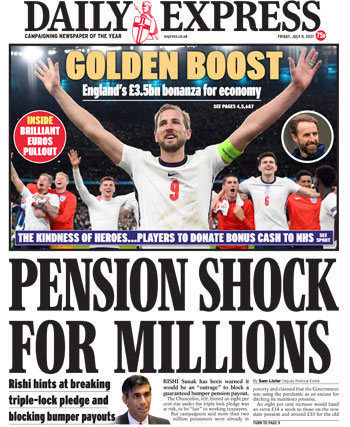
Question: What do you think when the Government you campaigned to get elected considers abandoning a manifesto pledge to save £3bn? The pandemic has thrown the economy into turmoil and savings have to be made. Answer: You are shocked.
Question: What do you think when the Government you campaigned to get elected abandons a manifesto pledge to save £4bn? The pandemic has thrown the economy into turmoil and savings have to be made. Answer: You are delighted.
Welcome to the world of the Daily Express.
The “triple lock” pledge for pensioners means the state pension may have to go up by 8% in the spring. This is apparently because of an anomalous surge in the cost of certain goods that are factored into the calculation. It would mean a rise of £10 or £14 a week, depending on which scheme you are in. But the Chancellor has said that he is going to look at this to see if it’s “fair”. Groups representing the elderly are naturally unhappy at the prospect and fear that once suspended, the triple lock that promises pensioners the best deal from various options will never return. The Express is on their side. Sort of.
Knowing its audience, the paper revived a tried and tested splash headline last Friday: “Pensions shock for millions” and started its story: “Rishi Sunak has been warned that it would be an outrage to block a guaranteed bumper pension payout.”
But when it came to the leader column, it acknowledged that the issue was “problematic”. You can say that again. How do you begin to justify giving an 8% pay rise to pensioners for whom the entire country has made 18 months of sacrifice when nurses who risked their lives to look after them are being offered 1%?
There were, the leader said, good reasons for the triple lock policy and any government should think twice before breaking an election promise… so the Chancellor should “think long and hard about where he plans to make his savings”.
It was much easier yesterday when it came to saving that £4bn. “PM sees off revolt on foreign aid cuts” proclaimed the puff, pointing to a page eight report accompanied by a sidebar headlined “Having a pop at barmy projects”. The story made clear that, while “a temporary measure”, the cut was likely to last several years. But it had no details of the impact of the cut or reporting of people concerned that it might never be restored.
Nor did the leader repeat its earlier worries about governments breaking an election promise. It pointed to an economic emergency and “extraordinary times” in which “every pound the government spends must be thoroughly justified”. Surely that should be the case in all circumstances?
The Express has long argued for cuts in foreign aid and increases in pensions. Its response to these two decisions is entirely consistent with its previous attitudes. The trouble is, they are totally inconsistent with each other.
Liz Gerard’s Notebook is a fortnightly column published in the InPubWeekly newsletter. To be added to the mailing list, enter your email address here.






